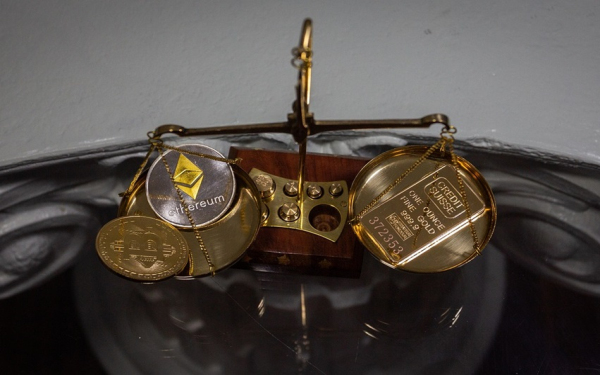Selling Gold, Buying Bitcoin? Unveiling the Devil in the Details

In recent times, a trend is emerging in the financial markets where there is a significant outflow of funds from gold Exchange-Traded Funds (ETFs) while a substantial amount of capital is flowing into Bitcoin ETFs. This shift has sparked debates on whether investors are reallocating their assets from the traditional gold market to the emerging Bitcoin market.
Capital Flow Analysis
The year-to-date data reflects a remarkable inflow of $10.6 billion into Bitcoin funds, propelled by the strong performance of Bitcoin spot ETFs. In contrast, physical gold ETFs witnessed an outflow of $7.6 billion during the same period.
Nikolaos Panigirtzoglou, Managing Director at JPMorgan Chase, highlighted that Bitcoin’s allocation in investor portfolios, post-volatility adjustments, has reached 3.7 times that of gold. Analysts estimate the market size of Bitcoin ETFs to have potentially reached $620 billion, with JPM Securities predicting a future growth to $2.2 trillion in 2 to 3 years.
Investor Sentiment and Analysis
Despite the apparent shift from gold to Bitcoin, there are dissenting views within the financial community. JPMorgan’s strategists, led by Nikolaos Panigirtzoglou, disagree with the notion of a direct transfer of funds. They argue that focusing solely on ETF capital flows may underestimate the purchase of physical gold by individuals and private investors and overestimate their Bitcoin investment, leading to misleading conclusions.
Individual and Private Investor Behavior
Contrary to the perception of a mass exodus from the gold market, data suggests that private and individual investors have been steadily increasing their gold investments. From the third quarter of 2020 onwards, their cumulative gold purchases have amounted to $230 billion, surpassing the outflow of gold ETFs and even exceeding central banks’ gold purchases.
Future Outlook
In considering the investment attributes of Bitcoin and gold, it’s evident that gold offers unique dual characteristics as both a currency and a commodity. While both Bitcoin and gold have limited supplies and can serve as alternatives to fiat currencies, gold’s historical acceptance and lower price volatility position it favorably compared to Bitcoin. Consequently, Bitcoin is unlikely to completely replace gold as an institutional asset, and gold is poised to maintain its significant position in institutional portfolios.
In conclusion, the current trend of capital flow from gold to Bitcoin does not necessarily indicate a full-scale transition. The nuances of individual and private investor behavior, coupled with the distinct monetary attributes of gold, emphasize the enduring relevance of gold as a crucial asset in investment portfolios.
Bitcoin
Funds
Gold
Precious Metals








